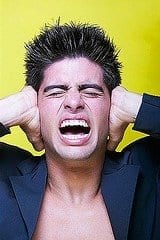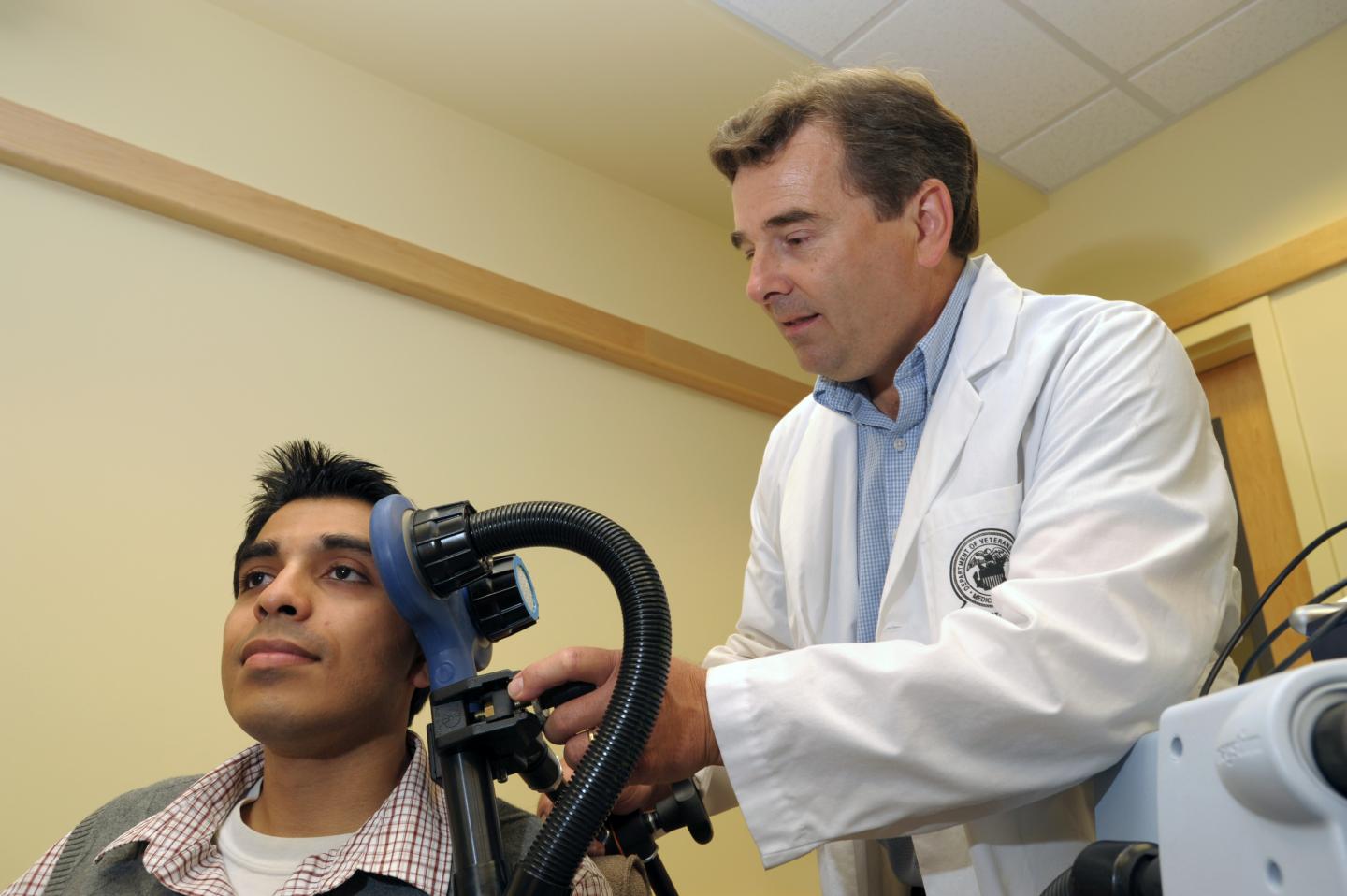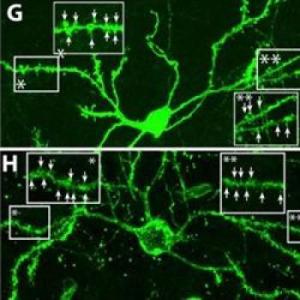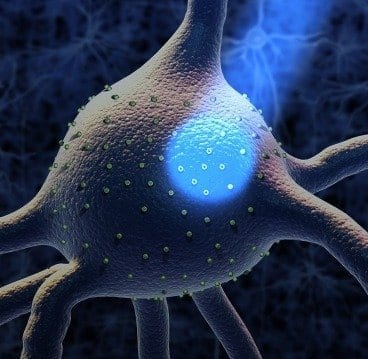
“There is no cure for it, and current therapies such as hearing aids don’t provide relief for many patients”
An epilepsy drug shows promise in an animal model at preventing tinnitus from developing after exposure to loud noise, according to a new study by researchers at the University of Pittsburgh School of Medicine. The findings, reported this week in the early online version of the Proceedings of the National Academy of Sciences, reveal for the first time the reason the chronic and sometimes debilitating condition occurs.
An estimated 5 to 15 percent of Americans hear whistling, clicking, roaring and other phantom sounds of tinnitus, which typically is induced by exposure to very loud noise, said senior investigator Thanos Tzounopoulos, Ph.D., associate professor and member of the auditory research group in the Department of Otolaryngology, Pitt School of Medicine.
“There is no cure for it, and current therapies such as hearing aids don’t provide relief for many patients,” he said. “We hope that by identifying the underlying cause, we can develop effective interventions.”
The team focused on an area of the brain that is home to an important auditory center called the dorsal cochlear nucleus (DCN). From previous research in a mouse model, they knew that tinnitus is associated with hyperactivity of DCN cells — they fire impulses even when there is no actual sound to perceive. For the new experiments, they took a close look at the biophysical properties of tiny channels, called KCNQ channels, through which potassium ions travel in and out of the cell.
“We found that mice with tinnitus have hyperactive DCN cells because of a reduction in KCNQ potassium channel activity,” Dr. Tzounopoulos said. “These KCNQ channels act as effective “brakes” that reduce excitability or activity of neuronal cells.”
In the model, sedated mice are exposed in one ear to a 116-decibel sound, about the loudness of an ambulance siren, for 45 minutes, which was shown in previous work to lead to the development of tinnitus in 50 percent of exposed mice. Dr. Tzounopoulos and his team tested whether an FDA-approved epilepsy drug called retigabine, which specifically enhances KCNQ channel activity, could prevent the development of tinnitus. Thirty minutes into the noise exposure and twice daily for the next five days, half of the exposed group was given injections of retigabine.
Seven days after noise exposure, the team determined whether the mice had developed tinnitus by conducting startle experiments, in which a continuous, 70 dB tone is played for a period, then stopped briefly and then resumed before being interrupted with a much louder pulse. Mice with normal hearing perceive the gap in sounds and are aware something had changed, so they are less startled by the loud pulse than mice with tinnitus, which hear phantom noise that masks the moment of silence in between the background tones.
The researchers found that mice that were treated with retigabine immediately after noise exposure did not develop tinnitus. Consistent with previous studies, 50 percent of noise-exposed mice that were not treated with the drug exhibited behavioral signs of the condition.
“This is an important finding that links the biophysical properties of a potassium channel with the perception of a phantom sound,” Dr. Tzounopoulos said. “Tinnitus is a channelopathy, and these KCNQ channels represent a novel target for developing drugs that block the induction of tinnitus in humans.”
The Latest Bing News on:
Noise-induced tinnitus
- A sound of hope for tinnitus victimson April 25, 2024 at 5:00 pm
Tinnitus is the sensation of a sound in the ear, usually a hissing, whooshing or ringing noise. Once, it was thought tinnitus was caused by a physical problem, but one new theory is that in some ...
- Construction workers reminded of importance of hearing protectionon April 24, 2024 at 3:21 am
Construction workers are being reminded of the importance of hearing protection this Noise Awareness Day. Noise-induced hearing loss is the most common preventable occupational health condition in the ...
- Top 6 Best Tinnitus Supplement in 2023on April 22, 2024 at 4:59 pm
Tinnitus is a condition affecting millions around the globe, characterized by a persistent and annoying ringing or buzzing noise in the ears. While a sure-fire cure for tinnitus hasn’t been ...
- Tinnitus Is Common in Children With and Without Hearing Impairmenton April 19, 2024 at 4:59 pm
In 2006, researchers in Gothenburg, Sweden, surveyed 756 children undergoing standard audiometric screening about whether they experienced noise-induced or spontaneous tinnitus (ringing ...
- Got tinnitus? A device that tickles the tongue helps this musician find reliefon April 15, 2024 at 2:00 am
It can be stressful, even panic-inducing and difficult to manage. Dozens of factors can contribute to the onset of tinnitus, including hearing loss, exposure to loud noise or a viral illness. The ...
- Why does lying down make tinnitus louder?on April 4, 2024 at 5:00 pm
The reason for this is not always apparent, but a potential cause includes being in a quieter sleep environment with fewer distractions from the noise. Tinnitus involves hearing a sound that is ...
- How long does it take for tinnitus to fade?on April 1, 2024 at 5:00 pm
For example, Ménière’s disease can cause tinnitus that may not go away as the disease is usually slowly progressive. Noise-induced hearing loss can cause tinnitus and can occur due to exposure ...
- Understanding Tinnitus: The Basicson March 30, 2024 at 5:01 pm
Up to 90% of people with tinnitus have some level of noise-induced hearing loss. The noise causes permanent damage to the sound-sensitive cells of the cochlea, a spiral-shaped organ in the inner ear.
The Latest Google Headlines on:
Noise-induced tinnitus
[google_news title=”” keyword=”noise-induced tinnitus” num_posts=”10″ blurb_length=”0″ show_thumb=”left”]
The Latest Bing News on:
Tinnitus
- A sound of hope for tinnitus victimson April 25, 2024 at 5:00 pm
A new treatment for tinnitus using vibrations created by synthesised music, improved symptoms in almost all patients during its first trial. The sonic brain reprogramming treatment, based on sound ...
- Best Hearing Aids For Tinnitus Of 2024, According To Audiologistson April 24, 2024 at 2:15 am
To determine the best hearing aids for tinnitus, the Forbes Health editorial team consulted several audiologists from the Forbes Health Advisory Board for product recommendations based on their ...
- Top 6 Best Tinnitus Supplement in 2023on April 22, 2024 at 4:59 pm
Tinnitus is a condition affecting millions around the globe, characterized by a persistent and annoying ringing or buzzing noise in the ears. While a sure-fire cure for tinnitus hasn’t been ...
- A new understanding of tinnitus and deafness could help reverse bothon April 18, 2024 at 12:13 pm
Investigations of the paradoxical link between tinnitus and hearing loss have revealed a hidden form of deafness, paving the way to possible new treatments ...
- Got tinnitus? A device that tickles the tongue helps this musician find reliefon April 15, 2024 at 2:00 am
More than 25 million adults in the U.S., have a condition called tinnitus, according to the American Tinnitus Association. It can be stressful, even panic-inducing and difficult to manage.
- Got tinnitus? A device that tickles the tongue helps this musician find reliefon April 15, 2024 at 2:00 am
More than 25 million adults in the U.S., have a condition called tinnitus, according to the American Tinnitus Association. It can be stressful, even panic-inducing and difficult to manage. Dozens of ...
- 'I've had tinnitus for over 10 years - here are my top 5 tips for living with the noise'on April 14, 2024 at 2:09 am
Express journalist Christopher Sharp has shared his top five tips on living with tinnitus despite its challenges.
- Why does lying down make tinnitus louder?on April 4, 2024 at 5:00 pm
Tinnitus may worsen when lying down at night for some people. The reason for this is not always apparent, but a potential cause includes being in a quieter sleep environment with fewer ...
- What can cause tinnitus flares?on April 1, 2024 at 5:00 pm
Factors, such as stress, noise exposure, and lack of sleep, can contribute to tinnitus flares. At other times, tinnitus may be less noticeable, giving the impression that tinnitus comes and goes.
- Understanding Tinnitus: The Basicson March 30, 2024 at 5:01 pm
Tinnitus (pronounced ti-ni-tus), or ringing in the ears, is the sensation of hearing ringing, buzzing, hissing, chirping, whistling, or other sounds. The noise can be intermittent or continuous ...
The Latest Google Headlines on:
Tinnitus
[google_news title=”” keyword=”Tinnitus” num_posts=”10″ blurb_length=”0″ show_thumb=”left”]










